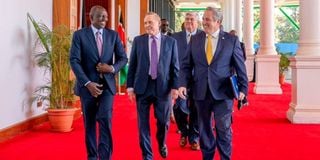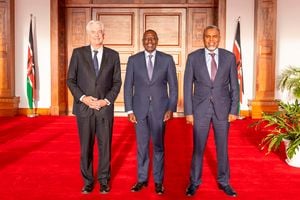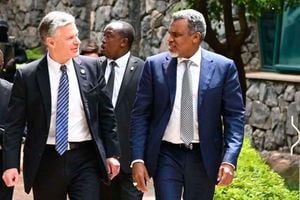
President William Ruto with lawmakers from the State of West Viginia, Rollan Roberts and Jack Woodrum, along with former Congressman Mark Deli at State House, Nairobi on January 16, 2025.
President William Ruto on Thursday hosted at State House, Nairobi, a delegation that included former Michigan Congressman Mark Deli Siljander, who previously served a prison sentence in the United States and South Sudanese politician Albino Mathom Abuog, who has faced scrutiny by Kenya’s anti-corruption watchdog, raising queries about the growing list of State guests with questionable past dealings.
Mr Siljander, 73, was convicted in 2012 of obstructing justice and acting as an unregistered foreign agent for a charity blacklisted by the US government for alleged links to terrorism. Meanwhile, Mr Abuog has been under investigation by the Ethics and Anti-Corruption Commission (EACC) over funds he reportedly received from former Lugari MP Cyrus Jirongo, which were suspected to be connected to a disputed land transaction.
“Kenya and the United States have a strategic relationship based on the shared values of democracy, freedom and global peace and security. These ties have also blossomed in our joint efforts in the fight against terrorism and other cross-border crimes. Initiatives such as the African Growth Opportunity Act (AGOA) have provided Kenya and Africa with greater access to the American market for our businesspeople and companies. Additionally, the US continues to be a key partner in the search for peace and stability in the region, especially in the Great Lakes and the Horn of Africa,” President Ruto said in a post on his official Facebook page.

President William Ruto (center) with lawmakers from the State of West Viginia Rollan Roberts and Jack Woodrum, former Congressman Mark Deli and South Sudanese politician Albino Mathom Aboug at State House, Nairobi on January 16, 2025.
Mr Woodrum is the junior West Virginia state senator. He assumed office in 2020, under the Republican Party.
Mr Roberts, also a Republican, is a member of the West Virginia Senate representing the 9th district.
The four Americans paid a courtesy call to President Ruto and later took pictures on the grounds of State House, Nairobi.
State House spokesperson Hussein Mohamed said the visit was “just a courtesy call. Whatever was discussed during the meeting was made public and posted on the President’s social media pages,” he added in a terse response.
He did not, however, respond to other questions sent on email that sought to establish, among other issues, whether President Ruto was aware of the questionable past of two of his visitors. The Nation also sought to know what was discussed in the meeting, and whether the US Embassy in Nairobi was involved in organising the visit.
Questions sent to the US Embassy in Nairobi had not been responded to by the time of going to press. There was no mention of the US lawmakers’ visit to Kenya in the Embassy’s social media handles as has happened in the past with official delegations.
The 73-year-old former congressman and author, an ally of President-elect Donald Trump, was in 2012 convicted by a US court for obstructing justice by lying to authorities about his ties to an organisation that funded Al Qaeda and its founder, Osama bin Laden.
He was in 2004 hired by the Islamic American Relief Agency (IARA), a charity group that the US Senate had blacklisted after being found to be a financier of terrorism.
Mr Siljander was hired to lobby for the Senate to strike IARA off the blacklist, and have it reinstated to the list of US government contractors.
IARA sent more than $1 million (Sh129 million) to Iraq, in violation of US sanctions in place at the time.
When investigations into IARA started in 2008, Mr Siljander lied to Federal Bureau of Investigations (FBI) agents on two occasions, telling them that the money he received from the blacklisted organisation was a donation intended to help him author a book. He later admitted to lying to the FBI.
Mr Sijander was convicted in 2012 for lying to the FBI, which he admitted to, and for acting as an unregistered foreign agent for the blacklisted charity. He was sentenced to serve one year and one day in prison.
After President Trump was sworn into office, he pardoned Mr Siljander, citing the former congressman’s strong stand against abortion.
Mr Siljander was one of the driving forces behind law amendments that banned the US government from funding activities that promote abortion, whether in the country or overseas.
His anti-abortion stance helped to secure the pardon.
While a pardon is forgiveness for crimes committed, under US law it does not overturn a conviction, but only reinstates some civil freedoms that other convicts are deprived of, including to hold public office.
Mr Abuog, a prominent politician in Juba and former member of the South Sudan National Legislative Assembly, was a special envoy appointed by President Salva Kiir in January 2024.
President Kiir, however, relieved Mr Abuog of his duties nine months later.
No official reason was given for his dismissal. Observers said his dismissal is related to behind-the-scenes happenings in peace talks dubbed the Tumaini initiative.
The Tumaini initiative is a high-level mediation intended to end conflict in South Sudan and avert another civil war.
Mr Abuog is a dual citizen of South Sudan and the US. The EACC summoned him in November, 2022 after he allegedly received money from Mr Jirongo that was believed to have been proceeds from a controvesial land deal.
The former Lugari MP received Sh250 million from Nairobi County as compensation for a 2.5-acre land in Mukuru kwa Reuben in 2020, before sending Sh126 million to four individuals, including Mr Abuog.
Central Organisation of Trade Unions (Cotu) secretary-general Francis Atwoli received Sh60 million, former Jubilee Party vice-chairperson David Murathe received Sh25 million, while former Chief Justice David Maraga got Sh3 million. Mr Atwoli, Mr Murathe and Mr Maraga at the time said Atwoli owed them money. Mr Abuog had not recorded his statement with the EACC at the time.
President Ruto has drawn criticism over some of the individuals he has hosted.
In early January, President Ruto welcomed controversial businessman Wicknell Chivayo to his Sugoi home.
Mr Chivayo’s Gwanda Solar Power is behind the construction of a $172 million (Sh22.2 billion) solar power plant in Zimbabwe, which has since stalled. He was also accused of impropriety in a $40 million (Sh5.1 billion) tender for supply of electoral materials.
In March 2023, President Ruto hosted 10 officials of Bridgin Foundation, a Belgian charity that has over 10 years traversed the world, promising to fund multimillion-dollar projects.
Bridgin Foundation promised to put up a $1 billion (Sh129.5 billion) hospital city in Malawi. The Malawi government has since started budgeting for use of taxpayer funds for construction of some of the promised infrastructure, following unfulfilled promises by Bridging Foundation.
The charity has no permanent office and its website has no information on its financiers. There is no record of any complete projects by the charity.
bwasuna@ke.nationmedia.com






